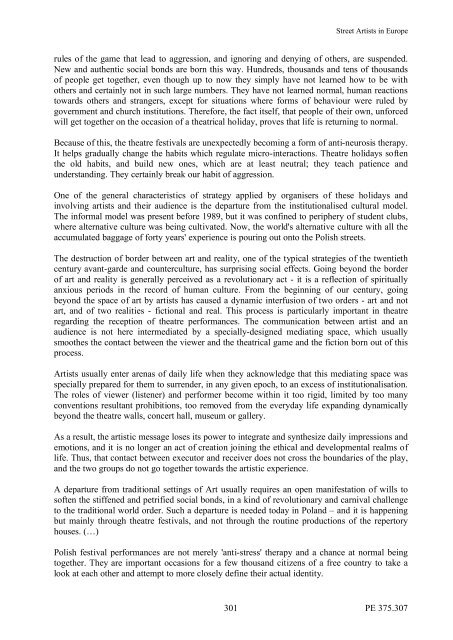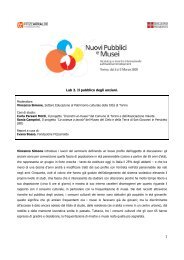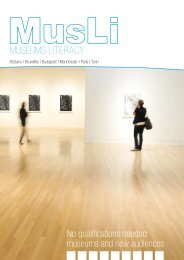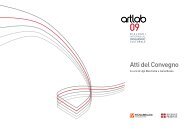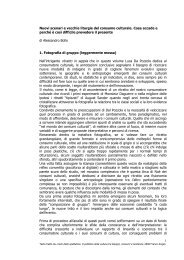STREET ARTISTS IN EUROPE - Fondazione Fitzcarraldo
STREET ARTISTS IN EUROPE - Fondazione Fitzcarraldo
STREET ARTISTS IN EUROPE - Fondazione Fitzcarraldo
You also want an ePaper? Increase the reach of your titles
YUMPU automatically turns print PDFs into web optimized ePapers that Google loves.
Street Artists in Europe<br />
rules of the game that lead to aggression, and ignoring and denying of others, are suspended.<br />
New and authentic social bonds are born this way. Hundreds, thousands and tens of thousands<br />
of people get together, even though up to now they simply have not learned how to be with<br />
others and certainly not in such large numbers. They have not learned normal, human reactions<br />
towards others and strangers, except for situations where forms of behaviour were ruled by<br />
government and church institutions. Therefore, the fact itself, that people of their own, unforced<br />
will get together on the occasion of a theatrical holiday, proves that life is returning to normal.<br />
Because of this, the theatre festivals are unexpectedly becoming a form of anti-neurosis therapy.<br />
It helps gradually change the habits which regulate micro-interactions. Theatre holidays soften<br />
the old habits, and build new ones, which are at least neutral; they teach patience and<br />
understanding. They certainly break our habit of aggression.<br />
One of the general characteristics of strategy applied by organisers of these holidays and<br />
involving artists and their audience is the departure from the institutionalised cultural model.<br />
The informal model was present before 1989, but it was confined to periphery of student clubs,<br />
where alternative culture was being cultivated. Now, the world's alternative culture with all the<br />
accumulated baggage of forty years' experience is pouring out onto the Polish streets.<br />
The destruction of border between art and reality, one of the typical strategies of the twentieth<br />
century avant-garde and counterculture, has surprising social effects. Going beyond the border<br />
of art and reality is generally perceived as a revolutionary act - it is a reflection of spiritually<br />
anxious periods in the record of human culture. From the beginning of our century, going<br />
beyond the space of art by artists has caused a dynamic interfusion of two orders - art and not<br />
art, and of two realities - fictional and real. This process is particularly important in theatre<br />
regarding the reception of theatre performances. The communication between artist and an<br />
audience is not here intermediated by a specially-designed mediating space, which usually<br />
smoothes the contact between the viewer and the theatrical game and the fiction born out of this<br />
process.<br />
Artists usually enter arenas of daily life when they acknowledge that this mediating space was<br />
specially prepared for them to surrender, in any given epoch, to an excess of institutionalisation.<br />
The roles of viewer (listener) and performer become within it too rigid, limited by too many<br />
conventions resultant prohibitions, too removed from the everyday life expanding dynamically<br />
beyond the theatre walls, concert hall, museum or gallery.<br />
As a result, the artistic message loses its power to integrate and synthesize daily impressions and<br />
emotions, and it is no longer an act of creation joining the ethical and developmental realms of<br />
life. Thus, that contact between executor and receiver does not cross the boundaries of the play,<br />
and the two groups do not go together towards the artistic experience.<br />
A departure from traditional settings of Art usually requires an open manifestation of wills to<br />
soften the stiffened and petrified social bonds, in a kind of revolutionary and carnival challenge<br />
to the traditional world order. Such a departure is needed today in Poland – and it is happening<br />
but mainly through theatre festivals, and not through the routine productions of the repertory<br />
houses. (…)<br />
Polish festival performances are not merely 'anti-stress' therapy and a chance at normal being<br />
together. They are important occasions for a few thousand citizens of a free country to take a<br />
look at each other and attempt to more closely define their actual identity.<br />
301<br />
PE 375.307


